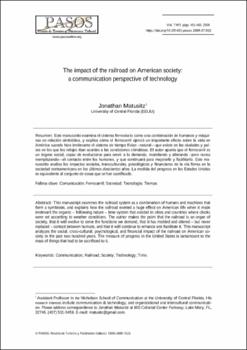The impact of the railroad on American society: a communication perspective of technology
Author
Matusitz, JonathanDate
2009Abstract
Este manuscrito examina el sistema ferroviario como una combinación de humanos y máqui-nas en relación simbiótica, y explica cómo el ferrocarril ejerció un importante efecto sobre la vida en América cuando hizo irrelevante el sistema de tiempo físico –natural—que existe en las ciudades y paí-ses en los que los relojes iban acordes a las condiciones climáticas. El autor apunta que el ferrocarril es un órgano social, capaz de evolucionar para servir a la demanda, modelando y alterando –pero nunca reemplazando—el contacto entre los humanos, y que continuará para mejorarlo y facilitarlo. Este ma-nuscrito analiza los impactos sociales, transculturales, psicológicos y financieros de la vía férrea en la sociedad norteamericana en los últimos doscientos años. La medida del progreso en los Estados Unidos es equivalente al conjunto de cosas que se han sacrificado This manuscript examines the railroad system as a combination of humans and machines that form a symbiosis, and explains how the railroad exerted a huge effect on American life when it made irrelevant the organic – following nature – time system that existed in cities and countries where clocks were set according to weather conditions. The author makes the point that the railroad is an organ of society, that it will evolve to serve the functions we demand, that it has molded and altered – but never replaced – contact between humans, and that it will continue to enhance and facilitate it. This manuscript analyzes the social, cross-cultural, psychological, and financial impact of the railroad on American so-ciety in the past two hundred years. The measure of progress in the United States is tantamount to the mass of things that had to be sacrificed to it





